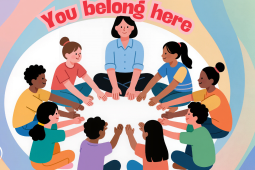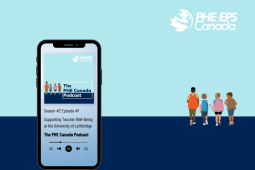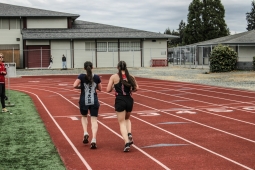Weaving Inclusion and Belonging into the Culture of a Healthy School
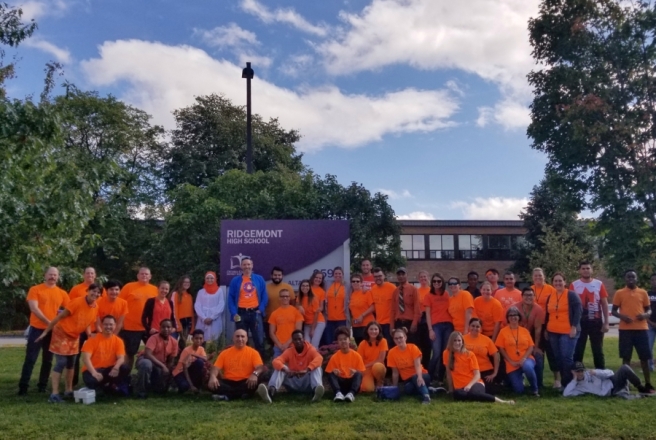
Weaving Inclusion and Belonging into the Culture of a Healthy School
Since the Canadian Healthy Schools Alliance launched the new Canadian Healthy School Standards in the summer of 2021, PHE Canada has heard many stories from across Canada that highlight the work of educators, staff, and administrators who exemplify the essential components of a healthy school and the wise practices outlined in the Standards.
Ridgemont High School is one such school, and we are honoured to share its story with you as a source of inspiration to continue your school's journey towards a healthy school.
Valuing diversity, community and belonging are foundational aspects of the school climate at Ridgemont High School. Teachers, school staff and administrators have been working from within their respective roles to bring the school community’s cultures and perspectives into curriculum, programming, activities, supports, events and decision-making.
Ridgemont’s leadership and staff live out their commitment to ensuring students feel seen and valued as members of the school community through a series of interconnected actions that place diversity, inclusion and belonging at the centre of the school’s culture. Staff strive to respect each student as a unique individual; students’ diverse cultural backgrounds are seen as strengths and reflected in the activities within the school; staff actively reach out to family members and engage them in the goings on at Ridgemont; and staff strive to be aware of and responsive to the cultural makeup of their school community. Ridgemont’s staff team partners with community members and organizations to increase capacity to promote health, wellbeing, cultural connection and a sense of belonging.
“I think our greatest strength is most certainly our diversity.”
Ridgemont weaves inclusion and wellbeing into the culture of the school through a series of interconnected and mutually reinforcing activities that are described here.
1. Dedicated Champions
Teachers and staff at Ridgemont have a long history of championing student health. Ridgemont has provided healthy breakfasts to students for many years thanks to a physical education teacher who champions healthy eating and a healthy lifestyle, both through their attitude and interactions, and by coordinating a food program and a community garden that brings together the school and the surrounding community to increase knowledge, skills and access to healthy food.
Students come to access healthy food in the morning, for a variety of reasons. The program’s philosophy is, it doesn't matter whether you've had breakfast or not, there's enough food for everybody when they come into the school - anyone can grab a snack to get their day started! In 2021, students could also pick up groceries to bring home every Friday. They loved that they were able to bring home a meal for their family for the weekend.
Healthy, accessible food support looked a bit different once the COVID-19 pandemic started to affect school life. Many students and families experienced illness or job loss and reached out to the school for support. Staff dropped off groceries to families or made grocery cards available for pickup at the school.
2. Students as Change-Makers
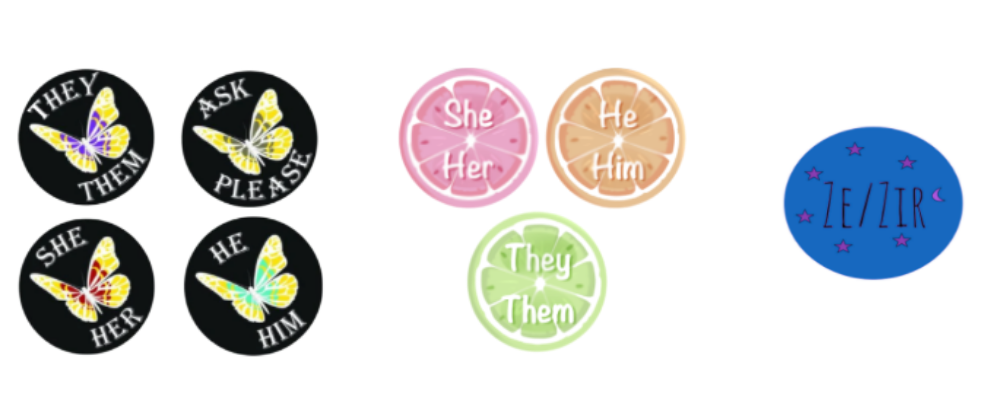
Teachers at Ridgemont High School are championing important initiatives that position students as change-makers and leaders within the school. The SPIRIT project is co-led by a dedicated teacher in partnership with an engaged group of students. SPIRIT is raising awareness and respect related to gender identity through student-led projects. SPIRIT members ordered hoodies with the school logo in rainbow colors with gender pronouns and flags on the sleeve, and involved graphic design classes in designing pins students can wear stating their gender pronouns. Through programs like SPIRIT and the Black Students Union, Ridgemont’s students are finding new spaces where they feel a sense of belonging within the school, which is increasing their self-confidence, helping them to find their voice and the comfort to speak up!
“It was like I was a facilitator, [and the students] were the leaders, they made all the decisions, they came up with all the ideas.”
- SPIRIT teacher champion
3. Administrative Leadership
At Ridgemont, the Principal uses their leadership role to create a climate where student and staff health, wellbeing, inclusion and belonging can flourish. The Principal (along with their staff team) is engaged in mobilizing a culture shift within the school community, participating in the journey in a self-aware, informed and active way, and working in partnership with teachers and other school staff to support student health and create a climate of wellbeing. Principals typically hold a gatekeeper role within schools, determining which individuals and organizations will have access. Ridgemont has been welcoming supportive community partners into the school, including Indigenous Knowledge Keepers, which has been enriching students’ experiences and creating cultural safety for students as well as acting on Truth and Reconciliation.
4. Resources that Support School Priorities
Ridgemont benefits from Urban Priority School Funding from the Ontario Ministry of Education. These resources allow the school team to implement supports for student health and wellbeing that are geared towards the specific needs and priorities of the school community. Ridgemont has invested in wellbeing by directing these resources towards activities, programs and resources that support student health and wellness, including the food programs described above, and through supports for learning in the form of over 700 computers and 100 hotspots provided to students so they could continue to learn at home during school closures. This connection also allowed students to continue their physical education classes, which supported stress reduction and their overall health and wellbeing.
5. Whole School Approach
The Ridgemont team works to create a climate of wellbeing, belonging and inclusion - a safe space where students feel comfortable to talk to teachers when they have a need. Teachers reach out to families to ensure they know how their student is doing at school, or work with the Liaison Officer to contact families that need to communicate with the school in a language other than English. Ridgemont is an incredibly diverse school with many languages spoken. To support engagement with families, school communications and newsletters are provided in multiple languages. By valuing the diversity within the school community and seeing it as a strength, Ridgemont is able to draw on this resource to enrich the learning experience and the sense of community within the school.
6. Wellbeing integrated across curricula
The goal of the SPIRIT project – a program run in partnership with PHE Canada - is to make physical education and athletics more inclusive. During the 2020-21 school year, a large group of students at Ridgemont High School (as well as projects at other schools in Canada) met weekly with a teacher champion, with students taking a leadership role. The group brainstormed ideas for making the school more inclusive and to make sure all students feel like they belong at Ridgemont, as well as removing barriers to being physically active.
Ridgemont’s SPIRIT team decided to focus on projects that would help the whole school feel more inclusive, starting by creating a slide deck to educate their fellow students about gender pronouns and normalize their use by all students, rather than having only gender diverse students singled out when sharing their pronouns. SPIRIT created a slide deck and a short guide to being more inclusive in terms of gender identity and the use of personal pronouns. Every Ridgemont teacher showed the slide deck to their class. Teachers could discuss the slide deck with their classes themselves or invite one of the students from the SPIRIT project to explain the content.
7. Indigenous Ways of Knowing
Ridgemont welcomed in an Indigenous Knowledge Keeper to participate in art and math classes, starting in person before COVID and then continuing through virtual learning. Students learned beading, which helped create a safe space for Indigenous students, but was also relatable for Arabic-speaking students who had similar cultural traditions. Students were able to do beading for multiple purposes, such as patterning for math classes, or bringing home jewelry for family and friends.
Ridgemont was able to partner with the Indigenous Knowledge Keeper through a combination of factors – the availability of Urban Priority School Funding; a pre-existing relationship between a Vice Principal and members of the Indigenous community; and having a school board that supports cross-curricular learning and bringing cultural knowledge into classroom settings.
8. Community Support and Connectivity
Ridgemont partnered with a local gym to provide CrossFit training to students and teachers, which offered students more ways to get involved in physical activity that interested them. In 2020-21, Ridgemont students participated in the worldwide CrossFit open, which increased community interest in getting involved with the program.
Ridgemont also worked with the Royal Ottawa Mental Health Center to provide a program for girls that brings together running and mental health. At the end, a local car dealership stepped in to pay the entry fees for students to participate in a 5 kilometer race.
“The experience has been very fun and collaborative with so many people involved in making it possible.”
9. Professional Development
School staff also work hard to learn about the students and their cultures and to reflect these many cultures within Ridgemont’s classrooms and lessons. In keeping with the large percentage of students who are newcomers to Canada, many arriving with experiences of trauma, staff at Ridgemont have been participating in training around trauma-informed approaches to working with youth. The goal is to continue offering workshops to teachers so that it can be at the centre of the work happening with students. Ridgemont staff have also created a learning circle focused on anti-racist education practices.
Acknowledgements
PHE Canada would like to thank Rachelle Sintic (Principal) and Katherine Lalonde (Teacher and SPIRIT project champion) of Ridgemont High School for sharing your time, experiences, innovations and insights with educators and administrators across Canada! We applaud the fantastic work Ridgemont High School is doing to support inclusion and wellness for its students and staff.
Author
Heather Callum, Lead, Engagement and Knowledge Mobilization, PHE Canada
Interviewees
Rachelle Sintic, Principal
Katherine Lalonde, Teacher (Science and Physical Education); SPIRIT project lead
(Ridgemont High School)
Additional resources
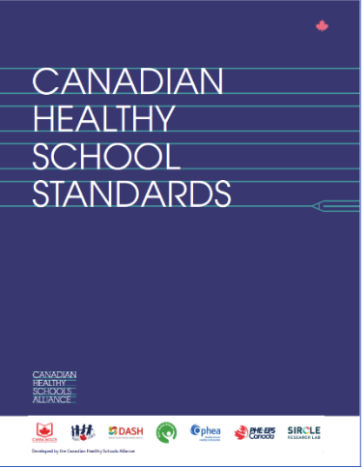
Check out the Canadian Healthy School Standards, the Toolkit for Healthy Schools Leadership, and other resources on the Canadian Healthy Schools Alliance website that can help you to create a climate of inclusion and wellbeing within your school communities!





